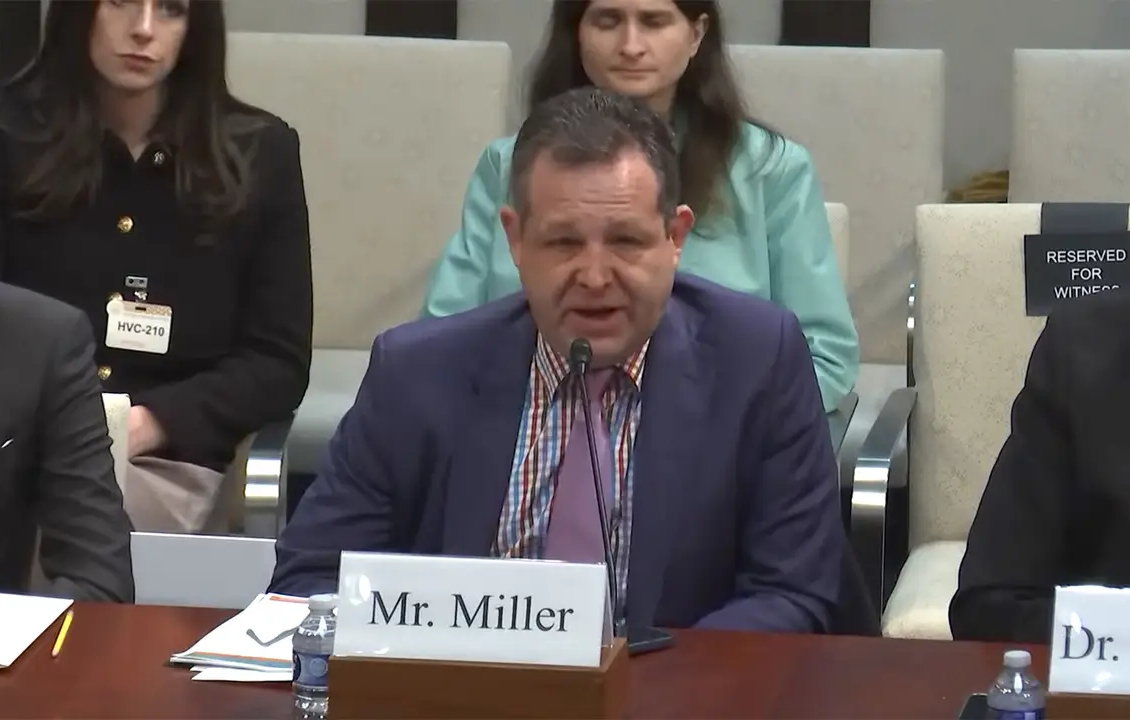[[{“value”:”
A congressional hearing meant to address the Food and Drug Administration’s (FDA) handling of non-psychoactive CBD turned into a discussion about intoxicating hemp products and health fears – and reflecting the ongoing power struggle between the hemp and marijuana interests over controls of the THC market.
During a House Oversight and Government Reform Committee hearing yesterday, hemp stakeholders pressed for long-awaited FDA regulations for CBD health products, while lawmakers used the session to air concerns about the proliferation of intoxicating hemp-derived substances like delta-8 THC — many of which are synthesized from CBD and are widely available under no regulations.
Jonathan Miller, general counsel for the U.S. Hemp Roundtable (USHR), told lawmakers the hemp industry is “begging for regulation” to provide clarity for producers and safety for consumers.
“Lack of uniform quality control standards for hemp products at the federal level has forced responsible farmers and small business owners to compete against unscrupulous actors who generate headlines by distributing poorly manufactured products that are sometimes inappropriately marketed to children,” Miller told the hearing. “We are hopeful that new leadership at the FDA will reverse the past course of inaction and take deliberate steps to robustly regulate hemp.”
Cannabis clash
The debate over intoxicants made from hemp reflects deeper tensions within the broader cannabis economy. Hemp stakeholders have argued that legislative efforts to ban all ingestible hemp products containing any measurable amount of THC – including CBD health supplements – are being driven by marijuana industry players seeking to eliminate competition and dominate the THC marketplace. Such a ban would outlaw 90-95% of current hemp products, USHR’s Miller said in a pre-written statement for the hearing.
On the other side, marijuana advocates and some lawmakers contend that intoxicating hemp products are competing unfairly with state-regulated marijuana businesses because they are sold outside of the strict licensing and testing regimes required for cannabis dispensaries.
Farm Bill’s intent
Rep. Pete Sessions (R-TX), who helped pass the 2018 Farm Bill that legalized hemp, told the hearing that the law was never intended to permit the sale of psychoactive substances derived from hemp. “I was told it was [hemp] ropes, things that are used by Americans every day,” Sessions said. “We’ve got to understand it is a dangerous product that causes IQ problems… and causes problems that are harmful to children.”
Rep. Tim Burchett (R-TN) also raised concerns about children being accidentally exposed to intoxicating hemp products. “It seems the rules and regulations are kind of all over the place,” he said.
CBD seeks a path
At the heart of the debate, however, is the FDA’s years-long reluctance to create a regulatory pathway for non-prescription CBD health products, despite repeated calls from Congress and industry. Miller blamed the agency’s “avoidable bureaucratic headwinds” for crushing U.S. hemp farmers and allowing bad actors to flourish. He said the price of hemp biomass has fallen more than 90% since 2019.
In his statement, Miller said: “We’ve watched in bewilderment as FDA has jerked back and forth with contradictory opinions. First, the agency affirmed its ability to regulate CBD under current law. And leaders at the agency clearly recognized that Congress wanted FDA to act quickly.
“But then, in the intervening years, FDA stalled, even ignoring congressional appropriations report directives to take expedited action. Meanwhile, federal regulatory uncertainty severely impacted the hemp and CBD market, with reduced manufacturing demand resulting in a more than 90 percent commodity price decline, crushing opportunities for U.S. farmers.”
FDA, in turn, has said existing federal safety standards are insufficient to manage the CBD industry, and has called on Congress to set rules for the products through legislation.
Recommendations
As for intoxicating substances made from hemp, Miller said USHR recommends a four-pillar regulatory approach that would:
Restrict youth access to hemp-derived THC products through age limits and safeguards for online sales.
Mandate quality control standards such as Good Manufacturing Practices and independent lab testing.
Standardize labeling to inform consumers and provide consistency across states.
Require child-resistant packaging and ban look-alike products that could appeal to children.”}]] Hemp stakeholders pressed for long-awaited FDA regulations for CBD health products, while lawmakers used the session to air concerns about intoxicating hemp substances. Read More


